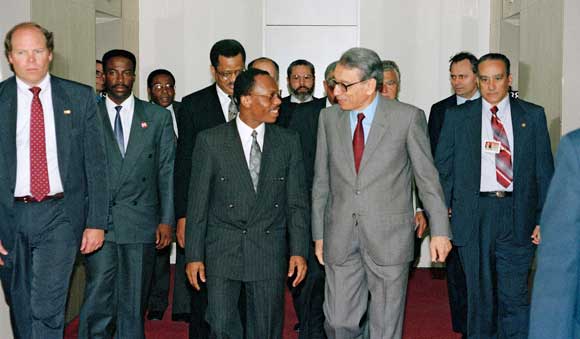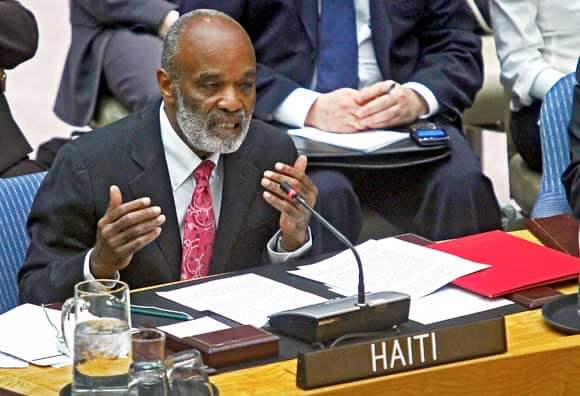The Haitian government said on Feb. 7 that it has issued a new passport to former president Jean-Bertrand Aristide that would enable him to end his exile in South Africa and return to the impoverished, French-speaking Caribbean country.
“The passport was issued on Monday [Feb. 7]. All the formalities have been completed,” an official confirmed to reporters, asking to remain anonymous.
He disclosed that the passport has been handed over to one of Aristide’s lawyers, Ira Kurzban, who is based in Miami. Kurzban had arrived in Haiti in recent days to get the passport.
Aristide, Haiti’s first democratically-elected leader, has been living in South Africa since he was ousted in 2004. In recent months, he has repeatedly requested to be allowed to return to his homeland.
He was forced to flee amid a popular revolt after two stints as president.
Haiti has been in turmoil since the Jan. 12, 2010 earthquake killed over 300,000 people and left 1.5 million homeless.
Presidential elections are also adding to increased tensions, with a long-delayed second round run-off to be held in March.
Last month, former dictator Jean-Claude “Baby Doc” Duvalier surprisingly returned from exile in France after 25 years, further fueling tensions.
Meanwhile, several hundred protesters clashed with riot police in Port-au-Prince, Haiti’s capital, on Feb. 7, demanding that President Rene Preval leave office immediately.
The police, backed by United Nations peacekeepers who were standing by, fired shots in the air and tear gas canisters to keep the chanting, stone-throwing demonstrators back from the presidential palace in central Champs de Mars square in Port-au-Prince.
The deciding second round of Haiti’s presidential election is scheduled to be held on Mar. 20 to choose a successor to Preval, whose five-year mandate nominally ended on Feb. 7.
A chaotic first round of presidential and legislative elections, held on Nov. 28, led to weeks of fraud allegations and sporadic protests, raising fears that prolonged political unrest could jeopardize delivery of billions of dollars of post earthquake reconstruction aid.
Preval said on Feb. 7 that he would stay in office for three more months, extending his term until after the Mar. 20 runoff.
An emergency law passed after last’s year’s devastating earthquake allowed Preval to stay longer because his 2006 inauguration was delayed.
His chief of staff, Fritz Longchamp, told reporters that Préval would leave on May 14, which would most likely be enough time for the next president to take over.
Préval’s decision was largely expected by Haitians and the international community, in part because it is unclear who would take his place.
The Haitian Constitution states that the highest-ranking member of the country’s top court would be second in line, but the court’s presidency is currently vacant.
José Miguel Insulza, the secretary general of the Organization of American States, which has been working closely with Haitian election officials, said that forming a transitional government for such a short period of time could lead to more difficulties for a country already struggling to create a peaceful transition of power.
“I would feel more comfortable with the president staying,” he said.
Mirlande Manigat, a constitutional scholar and one of the contenders to become Haiti’s next president, has said that she supports leaving Préval in power until after the runoff.
Jon Piechowski, spokesman for the U.S. Embassy in Port-au-Prince, said the United States “believes that a peaceful and orderly transition between President Preval and his elected successor is important for Haiti.
“The president and the people of Haiti will have to decide on the framework for this transition,” he said.
























